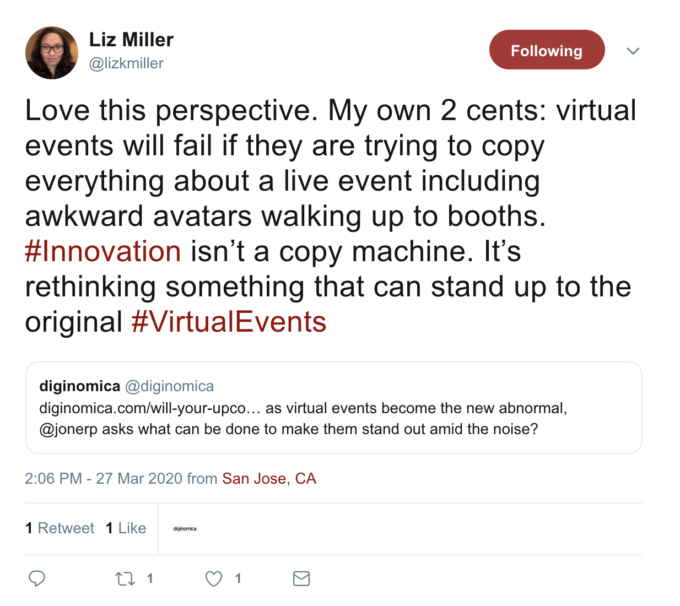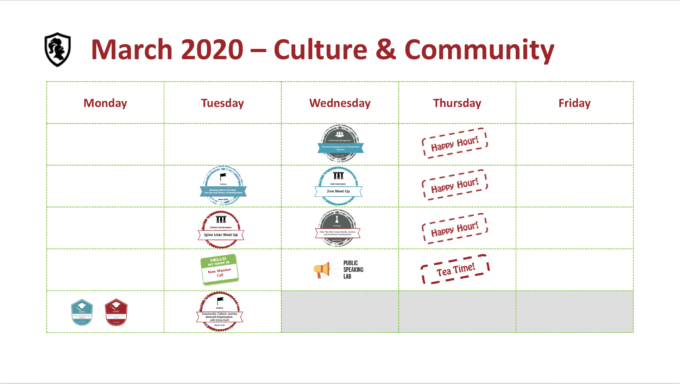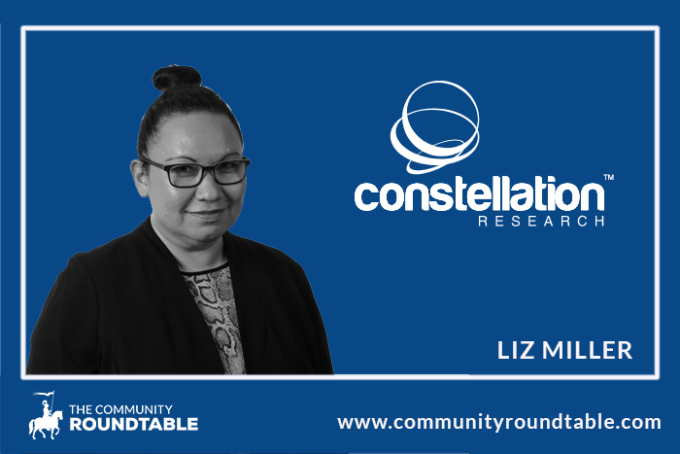Canceling events is the theme of 2020 so far – and it’s made many of us realize just how dependent our businesses are on them. Whether your organization produces workshops and training events, thought leadership and advocacy symposiums, or a huge annual customer event, it’s likely that a lot of revenue is tied up in them. How do you move an entire conference online?
The shut down of events is likely to cause a huge restructuring of the transportation and hospitality industries as planes sit idle and hotels stand empty. Some people have decided to cancel events. Many are considering how to adapt or restructure them. Others are quickly pivoting and moving events to an online-only format, like the Atlassian Summit.
The History of Online Conferences is Awkward
Remember the awkward Second Life Conferences? Yeh, they never resonated for me either, although maybe I’m showing my age… because I am sitting here, watching my daughter enjoy running around in Minecraft and Star Stable, both virtual games that she loves.
The Challenges of Online Conferences
The basic issue is one that Liz Miller of Constellation Research insightfully points out; just trying to replicate an offline conference in an online channel is the wrong way to think about this – it is a completely different medium. Yes, video conferencing and meeting software has gotten much better but no one wants to sit in front of a computer listening to people speak for hours on end.
Online Conferences as an Opportunity
One of the biggest challenges – and a huge opportunity – in bringing things online is it forces things to be explicit and transparent. That can be quite uncomfortable for those charged with producing events because they are paid to ensure smooth operations and predictability. Event producers do an amazing job with that – making sure food is there when needed, sessions start on time and with the right equipment, and everything from lighting to temperature to MC scripts are considered. It is a lot of work with high stakes because events are so expensive.
The reality for conference attendees, however, is that at least half of the value comes from ad hoc, emergent, and secondary events that happen around the edges of the main event. Event staff control and see very little of this explicitly and it is almost impossible to plan for… but it’s critical to the attendee experience.
Digital is no Longer an Afterthought
For too long, digital has been a secondary channel; it complements rather than hosts the main events. Because of that, it is used primarily to extend or replicate the offline conference experience. Streaming sessions, posting recordings, using apps to provide agenda and attendee information, and using webinars to run an ‘online’ event are common. But none of the digital supplements feels the same or offers the best part of a conference experience to attendees because they don’t provide the spaces and structures for building connections and relationships. The part of conferences that happens in between the formal structure at coffee breaks, restaurants, bars, and lounges are the experiences that drive business. People come for the content but at great conferences, they come back for the relationships.
What About Engagement?
Engagement, connection, and relationships are the precursor to transactions, not the outcome – and events are so valuable because they enable this. Many event producers take for granted that this will happen at conferences without overt planning. The best event planners know that designing prompts for attendee collisions ensures that outcome. They think about space design, room size, activities, type of food, and the attendee list based on the type of event.
How Do You Bring the Best Conference Experiences Online?
Digital channels are challenging not for their limitations but for the level of comfort and familiarity many people have in using them for building relationships. People tend to default to using digital properties for content consumption and sharing – even on social media. The best conferences include learning new things, sharing experiences and knowledge, and connecting with peers.
The challenge as event planners is to create ways for people to learn, share, and connect in a new medium. It’s creating programs and events that prompt members to engage and get to know each other. It’s mixing types of interaction because different people enjoy different ways to connect.
It sounds a heck of a lot like…. an online community.
It looks pretty different than a conference though. That is, however, the point – it uses the digital channel to its maximum advantage – extending sessions, programs, and discussions across the entire year rather than consolidating them in an exhausting two-day sprint. This not only allows members to learn more effectively but gives them the space and time to cultivate relationships in a way that builds strong bonds.
TheCR Network, for example, offers a variety of programs all designed to prompt different behaviors and different outcomes for different members. We combine all of those programs into monthly topic cycles, which we use to explore topics in a variety of different ways, with different audiences.
Some of TheCR Network programs include:
- Roundtable calls with guests who offer a perspective, technique or case study. Many of those calls are a mix of discussion and presented expertise. They are recorded and turned into recordings and reports for the library, available for years to come.
- User Groups for people who use the same platforms, work in the same industry or oversee similar use cases.
- Learning Cohorts that go through our training courses together with a facilitator, sharing their work, reflecting and discussing how they plan to apply the lessons.
- New Member Calls to help people navigate what is available, who is in the community, and how to get the most value out of their experience.
- Office Hours to discuss a specific topic with and get advice from an expert
- Partner Demos & Webinars so our members can explore the relevant technology and services they need to be successful.
- Working Groups that tackle a project together, whether helping TheCR team to define research or put together resources they all need to develop Centers of Excellence or other initiatives.
- Working Out Loud on a weekly basis to share their work and collectively understand what expertise is available.
- Skill Building Workshops that help members develop a specific skill like public speaking, measuring ROI or creating a roadmap.
- Happy Hour/Tea Time where members can join a group chat and blow off steam, discuss movies, or ask questions about work.
- Monday and Thursday Emails that summarize what’s going on, highlight new members, point to active discussions, and identify unanswered questions.
- Resource Bundles of curated content that include links to reports, discussions, and external expertise.
- Podcasts and Webinar recordings that give people access to interviews and other materials.
Members engage in different ways, constantly mixing and meeting each other, while learning, discussing, and sharing. Our goal for members is that they become better leaders of their own communities and by doing so get rewarded with more support, more staff, and more opportunities.
Upcoming Virtual Event
Join Liz Miller and me for a conversation about this and other topics on my weekly conversation series, Engagement That Scales next Friday, April 10th at 1pm ET.
Just like events, successful communities don’t just happen. They are lead and managed by professional community staff, which is why the best hire you can make during this crisis is a community manager.
Want to explore more resources about how effective communities are? Find podcasts, webinars, case studies, and more here.



